- Home
- Tom Stoppard
Plays 5 Page 2
Plays 5 Read online
Page 2
Chater Is that your estimation?
Septimus It is my intent.
Chater Is it, is it? Well, well! I do not understand you.
Septimus You see I have an early copy – sent to me for review. I say review, but I speak of an extensive appreciation of your gifts and your rightful place in English literature.
Chater Well, I must say. That is certainly … You have written it?
Septimus (crisply) Not yet.
Chater Ah. And how long does …?
Septimus To be done right, it first requires a careful re-reading of your book, of both your books, several readings, together with outlying works for an exhibition of deference or disdain as the case merits. I make notes, of course, I order my thoughts, and finally, when all is ready and I am calm in my mind …
Chater (shrewdly) Did Mrs Chater know of this before she – before you –
Septimus I think she very likely did.
Chater (triumphantly) There is nothing that woman would not do for me! Now you have an insight to her character. Yes, by God, she is a wife to me, sir!
Septimus For that alone, I would not make her a widow.
Chater Captain Brice once made the same observation!
Septimus Captain Brice did?
Chater Mr Hodge, allow me to inscribe your copy in happy anticipation. Lady Thomasina’s pen will serve us.
Septimus Your connection with Lord and Lady Croom you owe to your fighting her ladyship’s brother?
Chater No! It was all nonsense, sir – a canard! But a fortunate mistake, sir. It brought me the patronage of a captain of His Majesty’s Navy and the brother of a countess. I do not think Mr Walter Scott can say as much, and here I am, a respected guest at Sidley Park.
Septimus Well, sir, you can say you have received satisfaction.
Chater is already inscribing the book, using the pen and ink-pot on the table. Noakes enters through the door used by Chater. He carries rolled-up plans. Chater, inscribing, ignores Noakes. Noakes, on seeing the occupants, panics.
Noakes Oh!
Septimus Ah, Mr Noakes! – my muddy-mettled rascal! Where’s your spyglass?
Noakes I beg your leave – I thought her ladyship – excuse me –
He is beating an embarrassed retreat when he becomes rooted by Chater’s voice. Chater reads his inscription in ringing tones.
Chater ‘To my friend Septimus Hodge, who stood up and gave his best on behalf of the Author – Ezra Chater, at Sidley Park, Derbyshire, April 10th, 1809.’ (giving the book to Septimus) There, sir – something to show your grandchildren!
Septimus This is more than I deserve, this is handsome, what do you say, Noakes?
They are interrupted by the appearance, outside the windows, of Lady Croom and Captain Edward Brice, RN. Her first words arrive through the open door.
Lady Croom Oh, no! Not the gazebo!
She enters, followed by Brice who carries a leather-bound sketch book.
Mr Noakes! What is this I hear?
Brice Not only the gazebo, but the boat-house, the Chinese bridge, the shrubbery –
Chater By God, sir! Not possible!
Brice Mr Noakes will have it so.
Septimus Mr Noakes, this is monstrous!
Lady Croom I am glad to hear it from you, Mr Hodge.
Thomasina (opening the door from the music room) May I return now?
Septimus (attempting to close the door) Not just yet –
Lady Croom Yes, let her stay. A lesson in folly is worth two in wisdom.
Brice takes the sketch book to the reading stand, where he lays it open. The sketch book is the work of Mr Noakes, who is obviously an admirer of Humphry Repton’s ‘Red Books’. The pages, drawn in water-colours, show ‘before’ and ‘after’ views of the landscape, and the pages are cunningly cut to allow the latter to be superimposed over portions of the former, though Repton did it the other way round.
Brice Is Sidley Park to be an Englishman’s garden or the haunt of Corsican brigands?
Septimus Let us not hyperbolise, sir.
Brice It is rape, sir!
Noakes (defending himself) It is the modern style.
Chater (under the same misapprehension as Septimus) Regrettable, of course, but so it is.
Thomasina has gone to examine the sketch book.
Lady Croom Mr Chater, you show too much submission. Mr Hodge, I appeal to you.
Septimus Madam, I regret the gazebo, I sincerely regret the gazebo – and the boat-house up to a point – but the Chinese bridge, fantasy! – and the shrubbery I reject with contempt! Mr Chater! – would you take the word of a jumped-up jobbing gardener who sees carnal embrace in every nook and cranny of the landskip!
Thomasina Septimus, they are not speaking of carnal embrace, are you, Mama?
Lady Croom Certainly not. What do you know of carnal embrace?
Thomasina Everything, thanks to Septimus. In my opinion, Mr Noakes’s scheme for the garden is perfect. It is a Salvator!
Lady Croom What does she mean?
Noakes (answering the wrong question) Salvator Rosa, your ladyship, the painter. He is indeed the very exemplar of the picturesque style.
Brice Hodge, what is this?
Septimus She speaks from innocence not from experience.
Brice You call it innocence? Has he ruined you, child?
Pause.
Septimus Answer your uncle!
Thomasina (to Septimus) How is a ruined child different from a ruined castle?
Septimus On such questions I defer to Mr Noakes.
Noakes (out of his depth) A ruined castle is picturesque, certainly.
Septimus That is the main difference. (to Brice) I teach the classical authors. If I do not elucidate their meaning, who will?
Brice As her tutor you have a duty to keep her in ignorance.
Lady Croom Do not dabble in paradox, Edward, it puts you in danger of fortuitous wit. Thomasina, wait in your bedroom.
Thomasina (retiring) Yes, mama. I did not intend to get you into trouble, Septimus. I am very sorry for it. It is plain that there are some things a girl is allowed to understand, and these include the whole of algebra, but there are others, such as embracing a side of beef, that must be kept from her until she is old enough to have a carcass of her own.
Lady Croom One moment.
Brice What is she talking about?
Lady Croom Meat.
Brice Meat?
Lady Croom Thomasina, you had better remain. Your knowledge of the picturesque obviously exceeds anything the rest of us can offer. Mr Hodge, ignorance should be like an empty vessel waiting to be filled at the well of truth – not a cabinet of vulgar curios. Mr Noakes – now at last it is your turn –
Noakes Thank you, your ladyship –
Lady Croom Your drawing is a very wonderful transformation. I would not have recognized my own garden but for your ingenious book – is it not? – look! Here is the Park as it appears to us now, and here as it might be when Mr Noakes has done with it. Where there is the familiar pastoral refinement of an Englishman’s garden, here is an eruption of gloomy forest and towering crag, of ruins where there was never a house, of water dashing against rocks where there was neither spring nor a stone I could not throw the length of a cricket pitch. My hyacinth dell is become a haunt for hobgoblins, my Chinese bridge, which I am assured is superior to the one at Kew, and for all I know at Peking, is usurped by a fallen obelisk overgrown with briars –
Noakes (bleating) Lord Little has one very similar –
Lady Croom I cannot relieve Lord Little’s misfortunes by adding to my own. Pray, what is this rustic hovel that presumes to superpose itself on my gazebo?
Noakes That is the hermitage, madam.
Lady Croom I am bewildered.
Brice It is all irregular, Mr Noakes.
Noakes It is, sir. Irregularity is one of the chiefest principles of the picturesque style –
Lady Croom But Sidley Park is already a picture, and a most am
iable picture too. The slopes are green and gentle. The trees are companionably grouped at intervals that show them to advantage. The rill is a serpentine ribbon unwound from the lake peaceably contained by meadows on which the right amount of sheep are tastefully arranged – in short, it is nature as God intended, and I can say with the painter, ‘Et in Arcadia ego!’ ‘Here I am in Arcadia,’ Thomasina.
Thomasina Yes, mama, if you would have it so.
Lady Croom Is she correcting my taste or my translation?
Thomasina Neither are beyond correction, mama, but it was your geography caused the doubt.
Lady Croom Something has occurred with the girl since I saw her last, and surely that was yesterday. How old are you this morning?
Thomasina Thirteen years and ten months, mama.
Lady Croom Thirteen years and ten months. She is not due to be pert for six months at the earliest, or to have notions of taste for much longer. Mr Hodge, I hold you accountable. Mr Noakes, back to you –
Noakes Thank you, my –
Lady Croom You have been reading too many novels by Mrs Radcliffe, that is my opinion. This is a garden for The Castle of Otranto or The Mysteries of Udolpho –
Chater The Castle of Otranto, my lady, is by Horace Walpole.
Noakes (thrilled) Mr Walpole the gardener?!
Lady Croom Mr Chater, you are a welcome guest at Sidley Park but while you are one, The Castle of Otranto was written by whomsoever I say it was, otherwise what is the point of being a guest or having one?
The distant popping of guns heard.
Well, the guns have reached the brow – I will speak to his lordship on the subject, and we will see by and by – (She stands looking out.) Ah! – your friend has got down a pigeon, Mr Hodge. (calls out) Bravo, sir!
Septimus The pigeon, I am sure, fell to your husband or to your son, your ladyship – my schoolfriend was never a sportsman.
Brice (looking out) Yes, to Augustus! – bravo, lad!
Lady Croom (outside) Well, come along! Where are my troops?
Brice, Noakes and Chater obediently follow her, Chater making a detour to shake Septimus’s hand fervently.
Chater My dear Mr Hodge!
Chater leaves also. The guns are heard again, a little closer.
Thomasina Pop, pop, pop … I have grown up in the sound of guns like the child of a siege. Pigeons and rooks in the close season, grouse on the heights from August, and the pheasants to follow – partridge, snipe, woodcock, and teal – pop – pop – pop, and the culling of the herd. Papa has no need of the recording angel, his life is written in the game book.
Septimus A calendar of slaughter. ‘Even in Arcadia, there am I!’
Thomasina Oh, phooey to Death! (She dips a pen and takes it to the reading stand.) I will put in a hermit, for what is a hermitage without a hermit? Are you in love with my mother, Septimus?
Septimus You must not be cleverer than your elders. It is not polite.
Thomasina Am I cleverer?
Septimus Yes. Much.
Thomasina Well, I am sorry, Septimus. (She pauses in her drawing and produces a small envelope from her pocket.) Mrs Chater came to the music room with a note for you. She said it was of scant importance, and that therefore I should carry it to you with the utmost safety, urgency and discretion. Does carnal embrace addle the brain?
Septimus (taking the letter) Invariably. Thank you. That is enough education for today.
Thomasina There. I have made him like the Baptist in the wilderness.
Septimus How picturesque.
Lady Croom is heard calling distantly for Thomasina who runs off into the garden, cheerfully, an uncomplicated girl. Septimus opens Mrs Chater’s note. He crumples the envelope and throws it away. He reads the note, folds it and inserts it into the pages of ‘The Couch of Eros’.
SCENE TWO
The lights come up on the same room, on the same sort of morning, in the present day, as is instantly clear from the appearance of Hannah Jarvis; and from nothing else.
Something needs to be said about this. The action of the play shuttles back and forth between the early nineteenth century and the present day, always in this same room. Both periods must share the stage of the room, without the additions and subtractions which would normally be expected. The general appearance of the room should offend neither period. In the case of props – books, paper, flowers, etc. – there is no absolute need to remove the evidence of one period to make way for another. However, books, etc., used in both periods should exist in both old and new versions. The landscape outside, we are told, has undergone changes. Again, what we see should neither change nor contradict.
On the above principle, the ink and pens etc., of the first scene can remain. Books and papers associated with Hannah’s research, in Scene Two, can have been on the table from the beginning of the play. And so on. During the course of the play the table collects this and that, and where an object from one scene would be an anachronism in another (say a coffee mug) it is simply deemed to have become invisible. By the end of the play the table has collected an inventory of objects.
Hannah is leafing through the pages of Mr Noakes’s sketch book. Also to hand, opened and closed, are a number of small volumes like diaries (these turn out to be Lady Croom’s ‘garden books’). After a few moments, Hannah takes the sketch book to the windows, comparing the view with what has been drawn, and then she replaces the sketch book on the reading stand.
She wears nothing frivolous. Her shoes are suitable for the garden, which is where she goes now after picking up the theodolite from the table. The room is empty for a few moments.
One of the other doors opens to admit Chloë and Bernard. She is the daughter of the house and is dressed casually. Bernard, the visitor, wears a suit and a tie. His tendency is to dress flamboyantly, but he has damped it down for the occasion, slightly. A peacock-coloured display handkerchief boils over in his breast pocket. He carries a capacious leather bag which serves as a briefcase.
Chloë Oh! Well, she was here …
Bernard Ah … the french window …
Chloë Yes. Hang on.
Chloë steps out through the garden door and disappears from view. Bernard hangs on. The second door opens and Valentine looks in.
Valentine Sod.
Valentine goes out again, closing the door. Chloë returns, carrying a pair of rubber boots. She comes in and sits down and starts exchanging her shoes for the boots, while she talks.
Chloë The best thing is, you wait here, save you tramping around. She spends a good deal of time in the garden, as you may imagine.
Bernard Yes. Why?
Chloë Well, she’s writing a history of the garden, didn’t you know?
Bernard No, I knew she was working on the Croom papers but …
Chloë Well, it’s not exactly a history of the garden either. I’ll let Hannah explain it. The trench you nearly drove into is all to do with it. I was going to say make yourself comfortable but that’s hardly possible, everything’s been cleared out, it’s en route to the nearest lavatory.
Bernard Everything is?
Chloë No, this room is. They drew the line at chemical ‘Ladies”.
Bernard Yes, I see. Did you say Hannah?
Chloë Hannah, yes. Will you be all right? (She stands up wearing the boots.) I won’t be … (But she has lost him.) Mr Nightingale?
Bernard (waking up) Yes. Thank you. Miss Jarvis is Hannah Jarvis the author?
Chloë Yes. Have you read her book?
Bernard Oh, yes. Yes.
Chloë I bet she’s in the hermitage, can’t see from here with the marquee …
Bernard Are you having a garden party?
Chloë A dance for the district, our annual dressing up and general drunkenness. The wrinklies won’t have it in the house, there was a teapot we once had to bag back from Christie’s in the nick of time, so anything that can be destroyed, stolen or vomited on has been tactfully removed; tactlessly, I should say – (She is ab
out to leave.)
Bernard Um – look – would you tell her – would you mind not mentioning my name just yet?
Chloë Oh. All right.
Bernard (smiling) More fun to surprise her. Would you mind?
Chloë No. But she’s bound to ask … Should I give you another name, just for the moment?
Bernard Yes, why not?
Chloë Perhaps another bird, you’re not really a Nightingale.
She leaves again. Bernard glances over the books on the table. He puts his briefcase down. There is the distant pop-pop of a shotgun. It takes Bernard vaguely to the window. He looks out. The door he entered by now opens and Gus looks into the room. Bernard turns and sees him.
Bernard Hello.
Gus doesn’t speak. He never speaks. Perhaps he cannot speak. He has no composure, and faced with a stranger, he caves in and leaves again. A moment later the other door opens again and Valentine crosses the room, not exactly ignoring Bernard and yet ignoring him.
Valentine Sod, sod, sod, sod, sod, sod …
As many times as it takes him to leave by the opposite door, which he closes behind him. Beyond it, he can be heard shouting. Chlo! Chlo! Bernard’s discomfort increases. The same door opens and Valentine returns. He looks at Bernard.
Bernard She’s in the garden looking for Miss Jarvis.
Valentine Where is everything?
Bernard It’s been removed for the, er …
Valentine The dance is all in the tent, isn’t it?
Bernard Yes, but this is the way to the nearest toilet.
Valentine I need the commode.
Bernard Oh. Can’t you use the toilet?
Valentine It’s got all the game books in it.
Bernard Ah. The toilet has or the commode has?
Valentine Is anyone looking after you?
Bernard Yes. Thank you. I’m Bernard Nigh – I’ve come to see Miss Jarvis. I wrote to Lord Croom but unfortunately I never received a reply, so I –
Valentine Did you type it?
Bernard Type it?
Valentine Was your letter typewritten?
Bernard Yes.
Valentine My father never replies to typewritten letters. (He spots a tortoise which has been half-hidden on the table.) Oh! Where have you been hiding, Lightning? (He picks up the tortoise.)

 The Dog It Was That Died and Other Plays
The Dog It Was That Died and Other Plays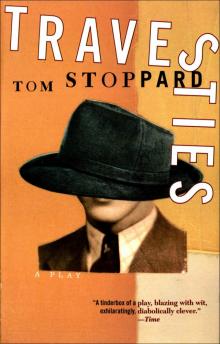 Travesties
Travesties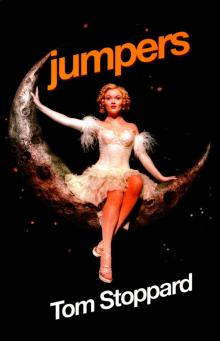 Jumpers
Jumpers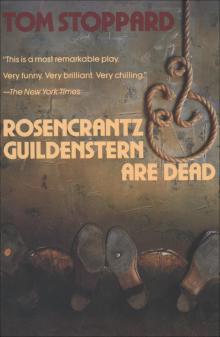 Rosencrantz and Guildenstern Are Dead
Rosencrantz and Guildenstern Are Dead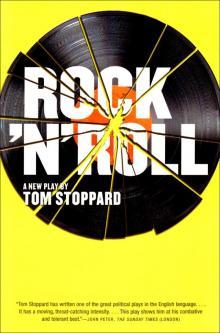 Rock 'N' Roll
Rock 'N' Roll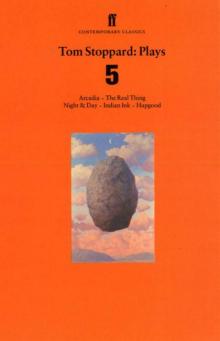 Plays 5
Plays 5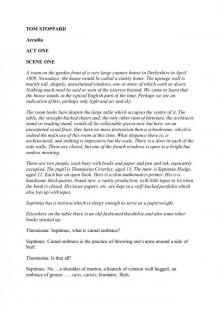 Arcadia
Arcadia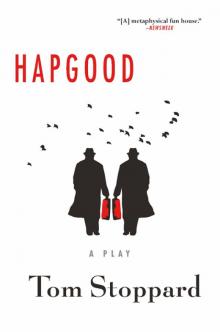 Hapgood
Hapgood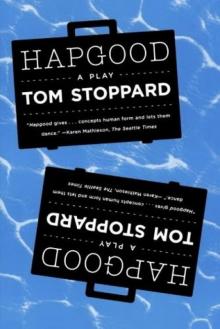 Hapgood: A Play
Hapgood: A Play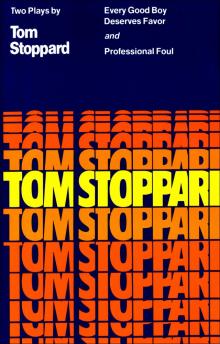 Every Good Boy Deserves Favor & Professional Foul
Every Good Boy Deserves Favor & Professional Foul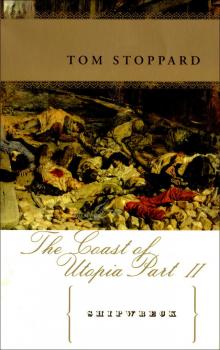 The Coast of Utopia: Voyage, Shipwreck, Salvage
The Coast of Utopia: Voyage, Shipwreck, Salvage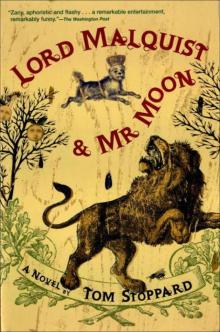 Lord Malquist & Mr. Moon
Lord Malquist & Mr. Moon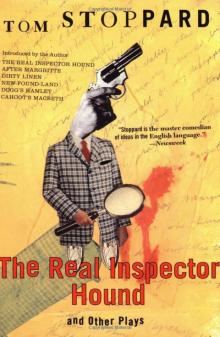 The Real Inspector Hound and Other Plays
The Real Inspector Hound and Other Plays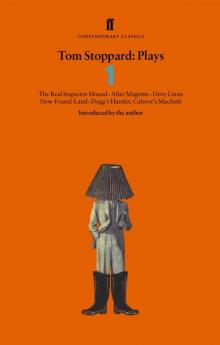 Tom Stoppard Plays 1
Tom Stoppard Plays 1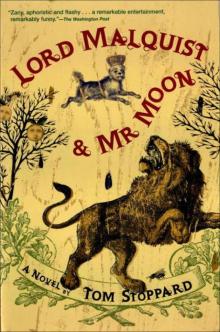 Lord Malquist & Mr. Moon: A Novel
Lord Malquist & Mr. Moon: A Novel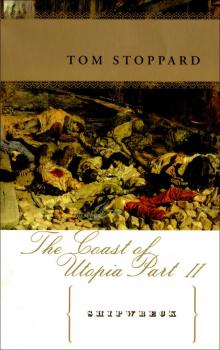 Shipwreck
Shipwreck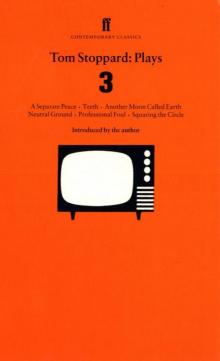 Tom Stoppard Plays 3
Tom Stoppard Plays 3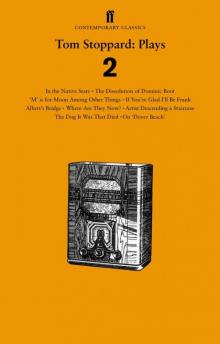 Tom Stoppard Plays 2
Tom Stoppard Plays 2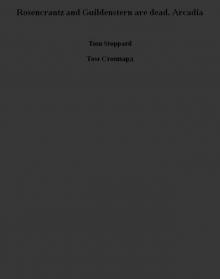 Rosencrantz and Guildenstern are dead. Arcadia
Rosencrantz and Guildenstern are dead. Arcadia